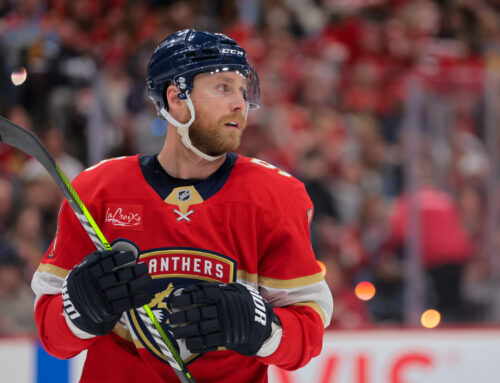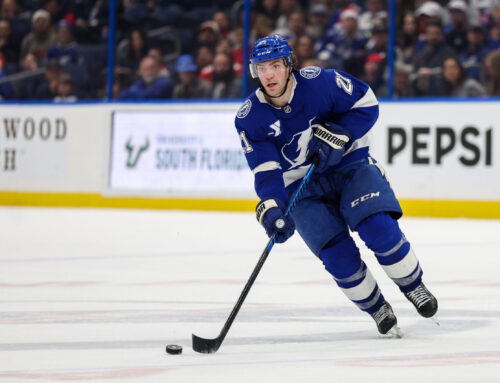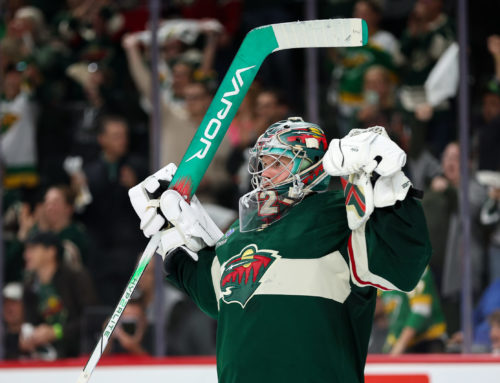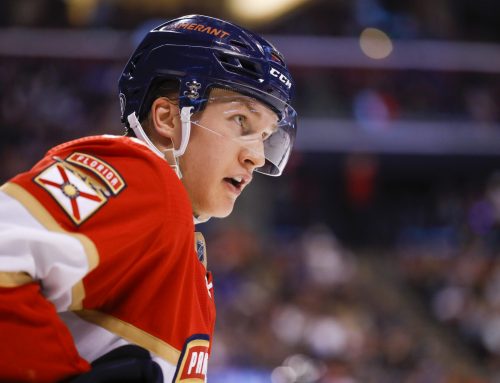
These eight players are good…but not worth the cost
In last week's column, I highlighted eight players who aren't as bad as they might seem. This week I figured I'd shift my focus to the other end of the spectrum – eight guys who are good, but not worth the cost it would likely take to obtain them via trade or in a draft for the 2013-14 season. In other words, any of these eight guys could be a very nice addition to your fantasy team in 2013-14, but you still might be best to avoid obtaining them because you'll likely have to pay too much of an inflated price.
Instead of a "Final Verdict" this week, after I discuss each player I'll give you an example of someone who should cost you about the same (or even less) to obtain but will likely give you better overall production in 2013-14.
What we're seeing from Krejci in this year's playoffs should be evoking a strong sense of déjà vu in everyone, as just two seasons ago Krecji led the entire NHL in playoff scoring. On the heels of that performance, many rushed out to grab him before the 2011-12 season, only to see him put up a good but not great 62 points in 79 games, which was likely below the 70+ point price they had to pay to obtain him. This playoffs has seen Krecji score at a jaw dropping pace (19 points in 13 games), but at the same time he's now two more years removed from his one and only regular season that saw him finish above 70 points. The reality is that no matter how well Krecji ends up performing in the playoffs, he'll still be returning to a Boston team where last season no forward other than Patrice Bergeron played more than 19:00 per game and an astonishing total of seven forwards all averaged between 2:13 and 1:58 per game on the PP. Under those circumstances, it's simply unrealistic to expect more from Krecji than right around 60 points next season, even though he'll be valued higher than that by most.
Who to target instead? Jamie Benn, who continued his improvement by scoring at a 66 point pace last season, but somehow still isn't seen by some to be a budding superstar. Dallas will be Benn's team to lead sooner rather than later, and his points should only continue to climb. Plus, unlike Krecji, he'll get more than enough ice time to produce.
Franzen is a player who seems to get drafted far too early every year. Don't get me wrong – there's value in a guy who should give you 25-30 goals per season, has netted 10 or more power play goals in a season four times, and is a +99 in 513 career games. But each year it seems he's drafted as if he's a candidate for 35-40 goals and/or 65-70 points, when he's just not going to give you those numbers. And if you look at this season, his 31 points in 41 games would project to a 62 point full season pace, likely leading to an even more inflated value for him going into 2013-14. The truth is that at age 33, Franzen has almost no chance of improving on his career bests, but instead has a very real risk of seeing his stats actually start to go down, particularly due to his style of play. I think we've reached a stage where it's best to let someone else draft Franzen in view of where he's likely to be selected.
Who to target instead? Wayne Simmonds or T.J. Oshie, both of whom are a lot younger than Franzen and should give you comparable stats, plus the breakout potential that Franzen lacks.
Richards is a lot like Krecji in that once the postseason begins he seems to go into a zone and morph into a different, more productive player. In fact, even though Richards had a two year stretch that saw him post 155 points in 152 regular season games, his career regular season scoring pace now stands at .74 points per game compared to .79 per game in the playoffs. And while Krecji's regular season handicap is playing for a deep Bruins team that roles out four lines and divides power play time so evenly among its scorers, Richards is stuck on a Kings team with a defense-first mentality that makes the New Jersey Devils teams of 1995-2005 look high flying by comparison. Do yourself a favor and resist the urge to factor in Richards' playoff performance on draft day, since you'll only end up disappointed if you do.
Who to target instead? Even though I covered him in a past column about players who I think will never hit 75 points, I still see Mikko Koivu as a good example of a guy who should be available around the time Richards would be selected but will give your team better stats.
Patrick Wiercioch
In the early days of fantasy hockey, Wiercoch would have been a legitimate sleeper going into next season, what with year-end stats (19 points in 42 games) that were good but not amazing. But in this era, Wiercoch is on everyone's sleeper radar, which means the temptation to grab him might lead to you drafting him far earlier than he should be selected, or trading too much to get him. Wiercoch does look to be poised for success at some point, but that still might still be a bit down the road from now. The reality is, in the 17 regular season games that Erik Karlsson played Wiercoch only dressed for 12 and had a grand total of four points. At this stage, I'd let someone else draft Wiercoch in a one-year league, as the chance that he breaks out is a lot less than him having a season that would lead to disappointment given the price it would take to get him.
Who to target instead? Christian Ehrhoff is a great example of a guy who some might ignore in favor of Wiercoch, as although both players scored at just below a 40 point pace last season Ehrhoff was a lot more under the radar (unless you're Jeff Angus ;-)). Do yourself a favor and go with the surer thing in Ehrhoff, instead of the upside possibilities of Wiercoch, unless you're in a keeper league where you can afford to wait for Wiercoch to mature.
One of the best "feel good" stories of 2012-13 was seeing Franson, who not too long ago had struggled to even crack the everyday Maple Leafs line-up, finish tied for sixth in the entire NHL for defenseman scoring, and follow that up with an impressive six points in seven playoff games. But what has me concerned about Franson going into next season is the summer of hype that is bound to happen given that he plays in one of hockey's biggest markets, plus the pressure of dealing with the spotlight and now being counted on to produce at an elite level. I'm afraid that Franson will be predicted (and valued) by many to breeze to 50+ points next season, but will actually only end up with around 40 points. While that would be very good output for a defenseman in today's NHL, it won't meet the unrealistic expectations that will be set for Franson.
Who to target instead? In the spirit of the struggles that Franson had to endure, you need look no further than Alex Goligoski as a viable alternative. Gologoski only finished with two fewer points than Franson, but many will wrongly see him as a risky pick. I also think that Michael Del Zotto's value right now is far too low, and he should outscore Franson not only in 2013-14 but in most years down the road as well.
In the span of less than three seasons, Moulson has gone from hugely undervalued to quite possibly overvalued. Once the secret got out that Moulson was no fluke and it became clear that he was stapled to budding superstar John Tavares, the price to get Moulson has climbed higher and higher every year. Unfortunately, while Tavares doesn't appear to have come close to hitting his points ceiling, it's quite possible that Moulson has already plateaued. Given where things stand, for the cost it would take to get Moulson you'd likely be better served by grabbing a player who's just as good a bet to give you 75+ points, but more apt to hit 85 if things go really well.
Who to target instead? Alex Semin, who, like Moulson, is still only 29 years old. But unlike Moulson, Semin is a dynamic player who actually finished at a point per game last season, and racked up an amazing 163 points in a 138 game stretch over two seasons earlier in his career.
Last season saw Pominville start and finish strong (14 points in his first 10 games, and 11 points in his last 12 games), but go ice cold in between, resulting in just under a 60 point scoring pace. Despite that, I think people will look at the nine points he posted in his ten games with the Wild, plus the 73 he had in 2011-12, and still value Pominville as a first line center. But the reality is that his ice time in Minnesota won't be anything near what he received in Buffalo, as supported by his 2:05 per game on the PP in Minnesota (compared to the 3:53 per game he averaged earlier last season with Buffalo, and a full minute less than the over 3:00 each for Dany Heatley, Mikko Koivu, and Zach Parise) and his lower overall TOI (17:31 in Minnesota, versus over 20 minutes per game in Buffalo). It would be a stretch to predict anything more than 60 points for Pominville in 2013-14, which is a problem since I think he'll be drafted more like a 65-70 point producer.
Who to target instead? Sam Gagner, who amazingly scored only nine points less in 48 games last season than he did in 75 games during 2011-12 (and that season included an eight point game). While it's true that Gagner also might not get first line minutes in Edmonton, the difference is that Edmonton will have a lot more talent on their second line than Minnesota. Plus, since Gagner is a RFA, he'll definitely get a big raise from whatever team he ends up playing for, and with that raise will come guaranteed ice time.
Patrik Elias
The now 37 year old Elias produced 36 points in 48 games, which amounts to .75 points per game. At first glance that seems pretty good, but it actually was his worst scoring pace in many years. The reality is that even the best, most durable players eventually slow down. And when that happens, the transformation from great to bad can occur quickly – look no further than Rod Brind'Amour, who went from 133 points in 137 games at age 36 and 37, to 70 points in his last 160 games at age 38 and 39. I don't see Elias' production dropping that much right away, but I think that between his age and the lack of offense that will be around him (Ilya Kovalchuk notwithstanding) on the Devils, it's unlikely to expect much more than 60 point this season or beyond. That's a problem, since for now he's still likely to be valued as a possible 70 point guy for the pretty near future.
Who to target instead? I'd try to grab one of two guys whose values are likely to be lower now than they'll ever be for years to come – Jordan Eberle or Jeff Skinner. Both are coming off years that were quite disappointing, and are prime candidates for big rebounds. I wouldn't be surprised to see either one still available in one year leagues around the time people would think to take Elias, so do yourself a favor and pounce on one of them instead.





 CHI
CHI BUF
BUF NYR
NYR TOR
TOR ANA
ANA PIT
PIT N.J
N.J L.A
L.A DET
DET CAR
CAR PHI
PHI
